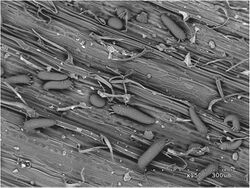Biology:Aceria tosichella
| Aceria tosichella | |
|---|---|

| |
| Electron micrograph of wheat curl mites (Aceria tosichella) on a wheat leaf | |
| Scientific classification | |
| Domain: | Eukaryota |
| Kingdom: | Animalia |
| Phylum: | Arthropoda |
| Subphylum: | Chelicerata |
| Class: | Arachnida |
| Family: | Eriophyidae |
| Genus: | Aceria |
| Species: | A. tosichella
|
| Binomial name | |
| Aceria tosichella Keifer, 1969
| |
Aceria tosichella, commonly known as the wheat curl mite (WCM),[1][2] is a global cereal pest[3] and a vector for spreading and transmission of viruses like wheat streak mosaic virus (WSMV)[4][5] and wheat mosaic virus (WMoV)[6][7]
Distribution
The distribution of this eriophyid mite is observed mostly in the wheat producing areas of Europe, North and South America.[8][9][10][11]
Biology
When it feeds on wheat, A. tosichella transmits the wheat streak mosaic virus. Infected plants show long yellow streaks, associated with some degree of chlorosis which may lead to death of the affected foliage. In Oklahoma, the disease usually appears in late April and early May when the weather warms up.[12]
Transcriptome
Recently, researchers at USDA-ARS published the whole transcriptome of WCM, and showed that WSMV infection alters gene expression of its vector, wheat curl mite, to enhance mite development and population expansion, to increase transmission.[13]
References
- ↑ Miller, A.D.; Umina, P.A.; Weeks, A.R.; Hoffmann, A.A. (2011). "Population genetics of the wheat curl mite (Aceria tosichella Keifer) in Australia: Implications for the management of wheat pathogens". Bulletin of Entomological Research 102 (2): 199–212. doi:10.1017/S0007485311000526. PMID 22030277.
- ↑ Skoracka, Anna. "Spatial distribution of Aceria tosichella (Acari: Eriophyoidea) biotypes differing in their host specificity and invasive potential". National Science Centre, Poland. http://www.staff.amu.edu.pl/~skoracka/wcm2_eng.html.
- ↑ Skoracka, Anna; Kuczyński, Lechosław; Santos De Mendonça, Renata; Dabert, Mirosława; Szydło, Wiktoria; Knihinicki, Danuta; Truol, Graciela; Navia, Denise (2012). "Cryptic species within the wheat curl mite Aceria tosichella (Keifer) (Acari : Eriophyoidea), revealed by mitochondrial, nuclear and morphometric data". Invertebrate Systematics 26 (4): 417–33. doi:10.1071/IS11037. http://www.alice.cnptia.embrapa.br/alice/handle/doc/951323.
- ↑ Thomas, John A.; Hein, Gary L. (2003). "Influence of volunteer wheat plant condition on movement of the wheat curl mite, Aceria tosichella, in winter wheat". Experimental and Applied Acarology 31 (3/4): 253–68. doi:10.1023/B:APPA.0000010384.12678.46. PMID 14974690.
- ↑ Skare, J.M.; Wijkamp, I.; Rezende, J.; Michels, G.; Rush, C.; Scholthof, K.-B.G.; Scholthof, H.B. (2003). "Colony establishment and maintenance of the eriophyid wheat curl mite Aceria tosichella for controlled transmission studies on a new virus-like pathogen". Journal of Virological Methods 108 (1): 133–7. doi:10.1016/S0166-0934(02)00257-4. PMID 12565164.
- ↑ Skoracka, Anna; Kuczyński, Lechosław; Szydło, Wiktoria; Rector, Brian (2013). "The wheat curl mite Aceria tosichella (Acari: Eriophyoidea) is a complex of cryptic lineages with divergent host ranges: Evidence from molecular and plant bioassay data". Biological Journal of the Linnean Society 109: 165–80. doi:10.1111/bij.12024.
- ↑ Navia, Denise; De Mendonça, Renata Santos; Skoracka, Anna; Szydło, Wiktoria; Knihinicki, Danuta; Hein, Gary L.; Da Silva Pereira, Paulo Roberto Valle; Truol, Graciela et al. (2012). "Wheat curl mite, Aceria tosichella, and transmitted viruses: An expanding pest complex affecting cereal crops". Experimental and Applied Acarology 59 (1–2): 95–143. doi:10.1007/s10493-012-9633-y. PMID 23179064. http://ainfo.cnptia.embrapa.br/digital/bitstream/item/75026/1/2012experimentalappliedacarology.pdf.
- ↑ Peairs, F.B.. "Mites in Wheat". Colorado State University. http://www.ext.colostate.edu/pubs/insect/05578.pdf.
- ↑ Chuang, Wen-Po (Nov 2013). "Two wheat curl mite, Aceria tosichella Keifer, biotypes have different responses on wheat". Entomological Society of America. http://esa.confex.com/esa/2013/webprogram/Paper78025.html.
- ↑ Castiglioni, Enrique; Navia, Denise (2010). "Presence of the Wheat Curl Mite, Aceria tosichella Keifer (Prostigmata: Eriophydae), in Uruguay". Agrociencia 14 (1): 19–26. http://www.scielo.edu.uy/scielo.php?script=sci_arttext&pid=S1510-08392010000100004. Retrieved 2013-11-20.
- ↑ Siriwetwiwat, Benjawan (2006). Interactions between the wheat curl mite, Aceria tosichella Keifer (Eriophyidae), and wheat streak mosaic virus and distribution of wheat curl mite biotypes in the field. University of Nebraska - Lincoln. ISBN 978-0-542-90873-6. http://digitalcommons.unl.edu/dissertations/AAI3237062/.[page needed]
- ↑ "Wheat streak mosaic virus". Oklahoma State University. http://entoplp.okstate.edu/ddd/diseases/wsmv.htm. Retrieved 7 October 2017.
- ↑ Adarsh K. Gupta. "Wheat streak mosaic virus alters the transcriptome of its vector, wheat curl mite (Aceria tosichella Keifer), to enhance mite development and population expansion". https://www.microbiologyresearch.org/content/journal/jgv/10.1099/jgv.0.001256.
Further reading
- Carew, M.; Schiffer, M.; Umina, P.; Weeks, A.; Hoffmann, A. (2009). "Molecular markers indicate that the wheat curl mite, Aceria tosichella Keifer, may represent a species complex in Australia". Bulletin of Entomological Research 99 (5): 479–86. doi:10.1017/S0007485308006512. PMID 19224660.
- Sánchez-Sánchez, H.; Henry, M.; Cárdenas-Soriano, E.; Alvizo-Villasana, H. F. (2001). "Identification of Wheat streak mosaic virus and Its Vector Aceria tosichella in Mexico". Plant Disease 85 (1): 13–7. doi:10.1094/PDIS.2001.85.1.13. PMID 30832063.
- Navia, Denise; Truol, Graciela; Mendonca, Renata S.; Sagadin, Monica (2006). "Aceria tosichella Keifer (Acari: Eriophyidae) from Wheat Streak Mosaic Virus-infected wheat plants in Argentina". International Journal of Acarology 32 (2): 189–93. doi:10.1080/01647950608684460. http://www.alice.cnptia.embrapa.br/alice/handle/doc/187696.
Wikidata ☰ Q16973921 entry
 |

